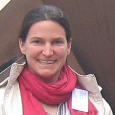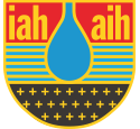Reach out to the public in the name of hydrogeology! Let’s even try this: Grow your network beyond professional constraints. When politicians make their decisions, make sure it’s based on scientific facts. You think you have no influence, because you are only a junior hydrogeologist? When you grow your network now, it will be large enough to reach out to decision makers once you are a senior hydrogeologist.
May 2018: We are delighted that Dr Judith Flügge has kindly agreed to answer questions for us. Many IAH members will know Judith, as she was one of those instrumental in helping set up our Early Career Hydrogeologists’ Network (ECHN) – something IAH is ever grateful for! Since then she has continued to give time to IAH, is currently involved in the German National Chapter’s committee and often seen speaking and helping out at Congresses and meetings…
 Tell us a little about yourself….
Tell us a little about yourself….
I am a hydrogeologist and groundwater modeller. I grew up in Berlin, where I studied Geological Engineering and Applied Geosciences at the Technical University. In 2005 I moved to Braunschweig for a postgraduate position at the Braunschweig University of Technology. As a research associate at the Institute for Environmental Geology, I was mainly responsible for teaching, eg GIS and geological mapping, but I also was involved in some of the institute’s research projects. My favourite project was dealing with the restitution/recultivation of artisanal tantalum mining wasteland in Rwanda, central Africa. At the same time, I was working on my doctoral thesis in collaboration with the Gesellschaft für Anlagen- und Reaktorsicherheit (GRS) gGmbH. GRS carries out research and analysis in the fields of reactor safety, radioactive waste management as well as radiation and environmental protection. My doctoral thesis was about the impacts of extreme climate states on the radionuclide transport in the overburden of a salt dome.
At the time of finishing my doctorate in 2009, I started working full time for GRS. My colleagues and I are performing long-term safety analyses for nuclear waste repositories. I am involved in several fundamental research projects, dealing with different host rock formations. My specific task is to model the (density-driven) groundwater flow and pollutant transport in large, heterogeneous, complex model areas over very long periods of time. Besides my modelling duties, I am also involved in lab work, eg I managed a laboratory project on diffusion through compacted crushed salt. In the context of the German-Russian scientific-technical cooperation, I am responsible for GRS contributions to research on radioactive waste disposal in crystalline formations. Since 2017, I am the German representative and vice-chair of the OECD/NEA Expert Group on Geological Repositories in Crystalline Formations (Crystalline Club – CRC). Since the beginning of 2018, I am the head of department for site selection at GRS, a challenging and exciting new task.
Why did you join IAH?
To tell the truth, at the time I joined IAH in 2004, I had no idea about the benefits or advantages that IAH membership may offer. I graduated from university and was looking for a job. Going abroad was definitely an option for me, so why not join an international network of experts of my profession? Application form completed, IAH membership obtained… and filed away.
It was only in 2010, when I attended the IAH congress in Krakow, Poland, and joined the first early career hydrogeologists’ meeting, that I became more involved in IAH issues. So, a better question for me would be: Why did I become involved in IAH matters?
This was a matter of being in the right spot at the right time. Based on the “Forward Look 2011 – 2020” initiative, IAH was looking on how to engage more of the younger or early career members in IAH issues and initiated this meeting. Of course, I had no idea about this background. I only attended the meeting and found that many early career hydrogeologists felt lost at the step from being a student to being an active part of the hydrogeology community. Following this meeting, a small group of early career hydrogeologists teamed up and established the early career hydrogeologists’ network (ECHN).
Looking back almost ten years later, this was an important step in rejuvenating the IAH structures and involving more junior hydrogeologists. Those, who had the chance to take part in recent ECHN activities, such as the social meetings at IAH congresses, the ECHN Coolest Paper Award, or the thematic sessions on how to write a paper or present in 15 minutes (just to name a few), will confirm this network has put a new momentum to IAH activities. I feel honoured, that I had the chance to be part of this energetic new group. Now, being the secretary of the German Chapter of IAH, I am striving to continue to support IAH’s mission to further the understanding, wise use and protection of groundwater resources throughout the world.
What have been the biggest changes over your career?
I studied applied geosciences with the aim to travel the world and to contribute to making it a better place by drilling drinking water wells. Basically, field work was one of the reasons for me to become a hydrogeologist. I love being outside, doing hands-on field work, and expanding my horizon by getting into touch with the local population. Over the years, with increasing management responsibility, this practical aspect of work fades and becomes secondary. Sometimes I miss the good old days of field work, with pH meter in one and a sample bottle in the other hand.
What are your concerns now or for the future, relating to groundwater/hydrogeology?
Judging from the recent developments worldwide, stable societal and political structures are fragile and thus the science-based decision making process becomes more and more vulnerable. Over-exploitation of groundwater, disrespecting the principles of sustainability, increasing energy consumption, intensive agriculture and irrigation, and pollution of groundwater are threats to our most valuable resource. With increasing political instability, there is an increasing need for a strong and recognised groundwater voice. We all need to be groundwater advocates for our utmost concern – the wise use of groundwater resources worldwide.
What three tips might you give to someone just starting out on their study or career?
- Network, network, network. This may sound like a selfish attitude, but there is more to it.
In the first place, a professional network will, of course, put you into touch with other experts in hydrogeology. You may grow your social media network and pimp your profile. You might get offered a job because you know the right people. Fair enough. - But let’s go beyond that: Talk to people. When you do field your work, talk to the local people and listen to what they can tell you. You might discover the essentials of your problem by “just” paying attention to their experiences and advice. When you are writing your thesis/a paper/a project proposal, give it to as many people as possible before submitting it. It can only gain from the different perceptions and reviews.
- Don’t be shy. Don’t sit in your office behind closed doors trying to finish your project on your own. It’s better to ask for advice and deal with criticism than to run a long way on the wrong track before realising it.
Reach out to the public in the name of hydrogeology! Let’s even try this: Grow your network beyond professional constraints. When politicians make their decisions, make sure it’s based on scientific facts. You think you have no influence, because you are only a junior hydrogeologist? When you grow your network now, it will be large enough to reach out to decision makers once you are a senior hydrogeologist.
What has being a member of IAH brought to you?
This might seem contrived, but it is the way it is: I have become a part of the IAH family. Attending an IAH congress is now like travelling to a family reunion. I have met so many interesting people, from renowned researchers to energetic juniors. The scientific exchange as well as the striving for a common goal unites hydrogeologists worldwide. And above all that – some of the professional relationships have turned into real friendships.
Dr Judith Flügge



